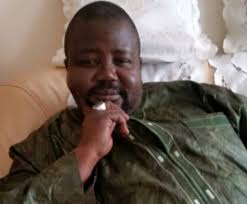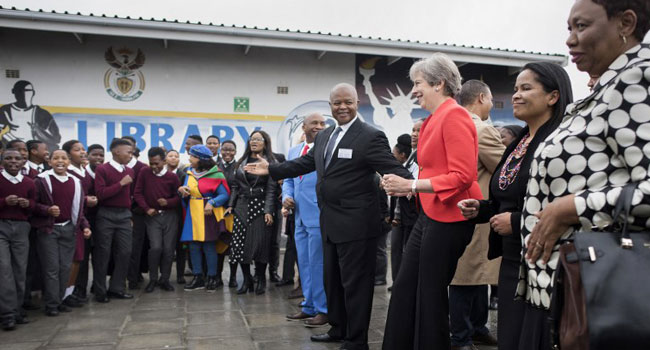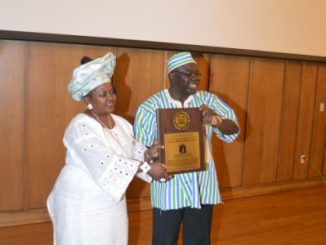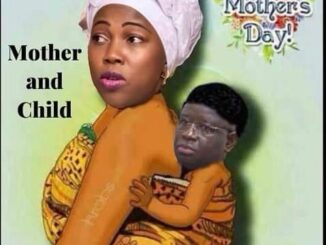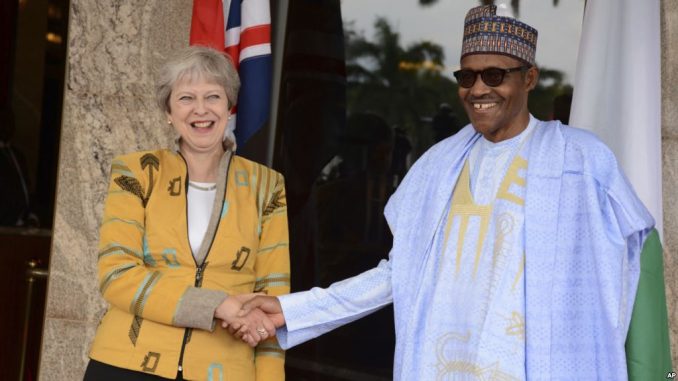
By Abdulai Mansaray
British Prime Minister Theresa May is following the footsteps of her ancestors – Mungo Park, David Livingstone and former British Prime Minister Lord Salisbury. On her African tour this week, she has danced the Kayamba in Kenya, Azonto in Nigeria and kpanlogo( Zulu) in South Africa.
The last time a sitting British Prime Minister – Margaret Thatcher visited Kenya, was 30 years ago in 1988.
ABDULAI MANSARAY
In the week that she has called for the UK to become the leading G7 investor in Africa by 2020, Theresa May has expressed her determination “to work side by side with Nigeria to help fight terrorism, reduce conflict and lay the foundations for the future stability and prosperity that will benefit us all”.
May’s sermon on this trip has been about bilateral relations with Africa, and trade seems to be the common denominator.
It is not like Britain was never in Africa, or like Britain had left after the independence of especially its former colonies. Britain had always maintained its ties with its former colonies and it even heads the Commonwealth; even though the wealth is not common.
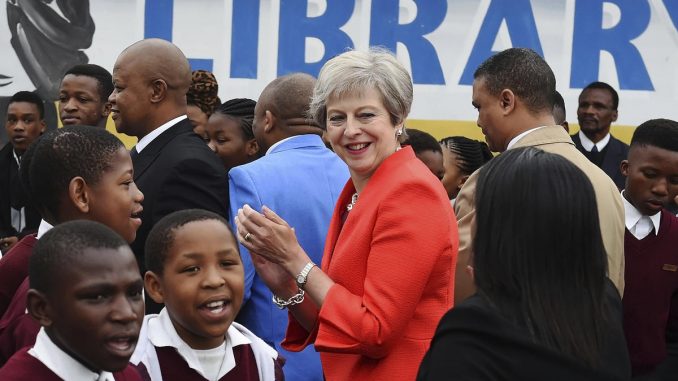
However, while Britain was in bed with the USA and busy preaching the Arab Spring in the Middle East, China was stealthily but cleverly slipping in to become the biggest player on the African continent.
President Kenyatta of Kenya suggested that the rules of engagement have changed, and that Africa and especially Kenya was open for competition.
You would think that the scramble for Africa, Part 2 would no longer be decided by a “few good men” in a marbled office in Berlin or New York. Like other African countries, he said that Kenya was “keen to seek friends across the world and we shall continue with China”.
Therefore, unlike the 1884 Berlin Conference, Europe has a new kid on the block to deal with China, for Africa’s attention. Donald Trump is busy tearing up every trade agreement from NAFTA, FTTA, WTO and MEFTA etc.; leaving a spaghetti bowl of individual free trade agreements strewn all over the place. He is busy cranking up tariffs here and there.
THERESA MAY IN SOUTH AFRICA
While Trump has taken a protectionist stance on trade, Britain has opted to leave the European Union, thanks to Brexit.
With the growing possibility that Britain might leave the EU without a deal; an outcome that, many of its citizens are beginning to see as a national self-harm behaviour, will that be the catalyst for the wind of change towards the “dark continent”?
It must be heart-warming to May when Kenyatta said he believed that “Brexit is not going to dent our ability to further strengthen and deepen trade and investment between two countries … I don’t see Brexit as meaning anything detrimental to trade ties we already have.” (BBC).
When a “few good men” sat around a big round oak table in Berlin to carve out Africa and its destiny in 1884-1885, many historians would have thought that this was the beginning of the end or the end of the beginning of Western domination of the “dark continent”.
That conference was later to be famously or notoriously (take your pick) known as The Scramble for Africa – The Race for Africa or The Partition of Africa.
To all intents and purposes, the partition of Africa was later interpreted as a way for the Europeans to eliminate the threat of a Europe-wide war over Africa.
Through military influence and economic dominance, the period that followed saw a transition of “informal imperialism”. This was hot on the heels of the abolition of the slave trade and the birth of the Industrial Revolution.
However, Africa as a continent did not take this wave of European aggression lying down. Many African states and rulers like the Ashanti, the Moroccans, the Abyssinians, the Zulus and Bai Bureh of Sierra Leone (Photo) tried to resist this but failed; thanks to the industrial revolution which had provided the Europeans the upper hand with more sophisticated machine guns.
In addition, African countries were so taken aback that they did not have enough time to form a continental united front to fight back.
It was in response to this blatant aggression that a Pan-African movement was born, which morphed into the Organisation of African Unity and present-day African Union.
There is the tired old cliché that history always repeats itself. The African continent must be bracing itself for another wave of European imperialism.
Suddenly, the continent has become the darling of its colonial masters, thanks to the twin forces of the global economy, but more so by the Brexit conundrum.
Even Donald Trump, who once described our continent as a “sh..hole” has been on the act. He once wrote in a letter to all 55 continental leaders that he “deeply respects” the people of Africa.
This new wave has seen African, European and American leaders crisscrossing the planet on mutual visits. Like the old days, these leaders have been scrambling over themselves, clocking air miles to woo the “dark Continent”. But to what does Africa owe this new-found affection?
Until recently, the only news about Africa was about migrants being rescued on the high seas and internecine wars. Africa had not only become a synonym for, but also had a monopoly on poverty, hunger and disease.
The last time Africa as a continent was mentioned on the global stage was during the recently concluded World Cup. Even at that, we only showed our potential. But as history tries to repeat itself, it might be worth comparing the 2 eras.
During the Berlin Conference in 1884, there was no African presence at the table. The continent only knew that the rules of engagement had changed by the barrel of the gun; and with a little help from the bible. This time, the masters are coming again to our doorsteps to “negotiate”.
So where is this love coming from? Perhaps the clue is in May’s promise to Kenya, that “as Britain prepares to leave the European Union we are committed to ensuring a smooth transition” and promising that Kenya would retain its duty-free quota access to the UK market”.
Now you know why a toad does not run in daylight for nothing; Africa has arrived at the round table. So what does this mean for Africa in real terms? Will Africans be at the Berlin table as partners in round two this time?
Will our African leaders realise how important the continent has become to our “masters” and maximise the benefits to our nations, or will they continue with their usual pursuit of self-interest and sign bad deals to stuff their pockets?
Will our leaders realise the potential of Africa, thanks to its resources that as a continent, we can be a major player on the global stage? Will they use this opportunity to turn Africa from a begging bowl to a member of the high table? Do our leaders even recognise our potential as a continent?
Interestingly this time, Africa has become the proverbial village beauty that every eligible bachelor is asking for her hand in marriage. With the likes of Trump leading the path to individual trade agreements and protectionism, does that signal the end of the global economy?
There is no doubt that in the second phase of the scramble for Africa, our colonial masters will come, bearing gifts and sweeteners. There is also no doubt that at some point during these negotiations and trade agreements, there will be some pulses and nerves pressing under the table; unlike the smell of gunpowder.
Nevertheless, should our African leaders learn to fly without perching, knowing that their counterparts have learnt to shoot without missing? What would this new wave mean for Africa and its people?
There is no question that Brexit will create losers and winners; if we can see it as that. Does that mean that Europe’s loss will be Africa’s gain? Is Africa about to become the biggest beneficiary of Brexit and the redefinition of the global economy?
Nevertheless, as the continent finds itself in this web of economic love affairs, there is a gnawing underbelly to it. If history is to repeat itself, this will not make for good reading. The question that you might be keen to answer is, is Africa about to become a victim of a return to the Cold War? No, I am not mad.
The return of the Cold War is going to be on economic terms. Until the end of the cold war (officially) Africa was the playground of the major players where political ideologies were traded in currencies of coups d’états.
We all know what happened to Thomas Sankara, when he decided to nationalise his country’s resources for the benefit of his people. He avoided foreign dictates and refused IMF and World Bank aid. He fought against debt-slavery. However, he was a lone voice and considered as leaning too far left. The rest is history.
Will Africa be ruled by puppet regimes as usual? Will the political landscape of Africa be determined by commercial and economic agreements? Is Africa about to become the playground for the economic cold war that is ensuing across the world? What are the political ramifications of this scramble for Africa phase 2?
Will the political lifespan of African leaders be dependent on who they sign trade agreements with or allow operating in their countries? Will this pending economic cold war trap Africa into its vortex; as it did during the cold war?
Let us assume and hope that the continent will benefit from this new economic romance. Nevertheless, will the benefits seep down to the average person or will the West continue to turn a blind eye, as African leaders continue to ravage their countries’ resources?
Is Africa about to benefit or suffer from a second wave of the resource curse from the second Scramble for Africa?
Our lives begin to end the day we become silent about the things that matter (M. L. King).
When a “few good men” sat around a big round oak table in Berlin, to carve out Africa and its destiny in 1884-1885, many historians would have thought that this was the beginning of the end or the end of the beginning of Western domination of the “dark continent”. That conference was later to be famously or notoriously (take your pick) known as The Scramble for Africa, The Race for Africa or The Partition of Africa. To all intents and purposes, the partition of Africa was later interpreted as a way for the Europeans to eliminate the threat of a Europe-wide war over Africa.
Through military influence and economic dominance, the period that followed saw a transition of “informal imperialism”. This was hot on the heels of the abolition of the slave trade and the birth of the Industrial Revolution. However, Africa as a continent did not take this wave of European aggression lying down. Many African states and rulers like the Ashanti, the Moroccans, the Abyssinians, the Zulus and Bai Bureh tried to resist this but failed; thanks to the industrial revolution which had provided the Europeans the upper hand with more sophisticated machine guns. In addition, African countries were so taken aback that they did not have enough time to form a continental united front to fight back. It was in response to this blatant aggression that a Pan-African movement was born, which morphed into the Organisation of African Unity and present day African Union.
British Prime Minister Theresa May, left, is welcomed by Nigeria’s President Muhammadu Buhari, at the Presidential palace in Abuja, Nigeria, Aug. 29, 2018.
There is the tired old cliché that history always repeats itself. The African continent must be brazing itself for another wave of European imperialism. All of a sudden, the continent has become the darling of its colonial masters, thanks to the twin forces of the global economy,but more so by the Brexit connundrum. Even Donald Trump, who once described our continent as a “sh..hole” has been on the act. He once wrote in a letter to all 55 continental leaders that he “deeply respects” the people of Africa. This new wave has seen African, European and American leaders crisscrossing the planet on mutual visits. Like the old days, these leaders have been scrambling over themselves, clocking air miles to woo the “dark Continent”. But to what does Africa owe this new found affection?
Until recently, the only news about Africa was about migrants being rescued on the high seas and internecine wars. Africa had not only become a synonym for, but also had monopoly on poverty, hunger and disease. The last time Africa as a continent was mentioned on the global stage was during the recently concluded World Cup. Even at that, we only showed our potential. But as history tries to repeat itself, it might be worth comparing the 2 eras. During the Berlin Conference in 1884, there was no African presence at the table. The continent only knew that the rules of engagement had changed by the barrel of the gun; and with a little help from the bible. This time, the masters are coming again to our doorsteps to “negotiate”.
The British Prime Minister Theresa May has been following the footsteps of her ancestors like Mungo Park, David Livingstone and the former British Prime Minister Lord Salisbury. Her African tour has seen her dance the Kayamba in Kenya, Azonto in Nigeria and kpanlogo( Zulu) in South Africa. The last time a sitting British Prime Minister Margaret Thatcher, visited Kenya was 30 years ago in 1988. In the week that she has called for the UK to become the leading G7 investor in Africa by 2020, Theresa May has expressed her determination “to work side by side with Nigeria to help them fight terrorism, reduce conflict and lay the foundations for the future stability and prosperity that will benefit us all”. May’s sermon on this trip has been about bilateral relations with Africa, and trade seems to be the common denominator.
It is not like Britain was never in Africa, or like Britain had left after the independence of especially its former colonies. Britain had always maintained its ties with its former colonies and it even heads the Commonwealth; even though the wealth is not common. However, while Britain was in bed with the USA and busy preaching the Arab Spring in the Middle East, China was stealthily but cleverly slipping in to become the biggest player on the African continent. President Kenyatta of Kenya suggested that the rules of engagement have changed, and that Africa and especially Kenya was open for competition. You would think that the scramble for Africa, part 2 would no longer be decided by a “few good men” in a marbled office in Berlin or New York. Like other African countries, he said that Kenya was “keen to seek friends across the world and we shall continue with China”.
Therefore, unlike the 1884 Berlin Conference, Europe has a new kid on the block to deal with China, for Africa’s attention. Donald Trump is busy tearing up every trade agreement from NAFTA, FTTA, WTO and MEFTA etc.; leaving a spaghetti bowl of individual free trade agreements strewn all over the place. He is busy cranking up tariffs here and there. While Trump has taken a protectionist stance on trade, Britain has opted to leave the European Union, thanks to Brexit. With the growing possibility that Britain might leave the EU without a deal; an outcome that, many of its citizens are beginning to see as a national self-harm behaviour, will that be the catalyst for the wind of change towards the “dark continent”? However, it must be heart-warming to May when Kenyatta said he believed that “Brexit is not going to dent our ability to further strengthen and deepen trade and investment between two countries … I don’t see Brexit as meaning anything detrimental to trade ties we already have.”(BBC)
So where is this love coming from? Perhaps the clue is in May’s promise to Kenya, that “as Britain prepares to leave the European Union we are committed to ensuring a smooth transition” and promising that Kenya would retain its duty-free quota access to the UK market”. Now you know why a toad does not run in daylight for nothing; Africa has arrived at the round table. So what does this mean for Africa in real terms? Will Africans be at the Berlin table as partners in round two this time? Will our African leaders realise how important the continent has become to our “masters” and maximise the benefits to our nations, or will they continue with their usual pursuit of self interest and sign bad deals to stuff their pockets? Will our leaders realise the potential of Africa, thanks to its resources that as a continent, we can be a major player on the global stage? Will they use this opportunity to turn Africa from a begging bowl to a member of the high table? Do our leaders even recognise our potential as a continent?
Interestingly this time, Africa has become the proverbial village beauty that every eligible bachelor is asking for her hand in marriage. With the likes of Trump leading the path to individual trade agreements and protectionism, does that signal the end of the global economy? There is no doubt that in the second phase of the scramble for Africa, our colonial masters will come, bearing gifts and sweeteners. There is also no doubt that at some point during these negotiations and trade agreements, there will be some pulses and nerves pressing under the table; unlike the smell of gunpowder. Nevertheless, should our African leaders learn to fly without perching, knowing that their counterparts have learnt to shoot without missing? What would this new wave mean for Africa and its people? There is no question that Brexit will create losers and winners; if we can see it as that. Does that mean that Europe’s loss will be Africa’s gain? Is Africa about to become the biggest beneficiary of Brexit and the redefinition of the global economy?
Nevertheless, as the continent finds itself in this web of economic love affairs, there is a gnawing underbelly to it. If history is to repeat itself, this will not make for good reading. The question that you might be keen to answer is, is Africa about to become a victim of a return to the Cold War? No, I am not mad. The return of the Cold War is going to be on economic terms. Until the end of the cold war (officially) Africa was the playground of the major players where political ideologies were traded in currencies of coups d’états. We all know what happened to Thomas Sankara, when he decided to nationalise his country’s resources for the benefit of his people. He avoided foreign dictates and refused IMF and World Bank aid. He fought against debt-slavery. However, he was a lone voice and considered as leaning too far left. The rest is history.
Will Africa be ruled by puppet regimes as usual? Will the political landscape of Africa be determined by commercial and economic agreements? Is Africa about to become the playground for the economic cold war that is ensuing across the world? What are the political ramifications of this scramble for Africa phase 2? Will the political lifespan of African leaders be dependent on who they sign trade agreements with or allow operating in their countries? Will this pending economic cold war trap Africa into its vortex; as it did during the cold war? Let us assume and hope that the continent will benefit from this new economic romance. Nevertheless, will the benefits seep down to the average person or will the West continue to turn a blind eye, as African leaders continue to ravage their countries’ resources? Is Africa about to benefit or suffer from a second wave of the resource curse from the second Scramble for Africa?
Our lives begin to end the day we become silent about the things that matter (M. L. King).
Abdulai Mansaray.

